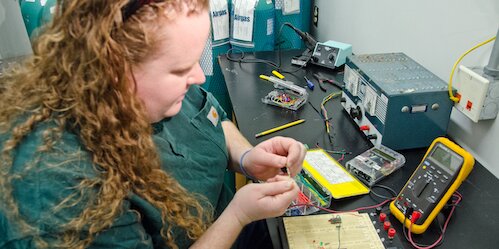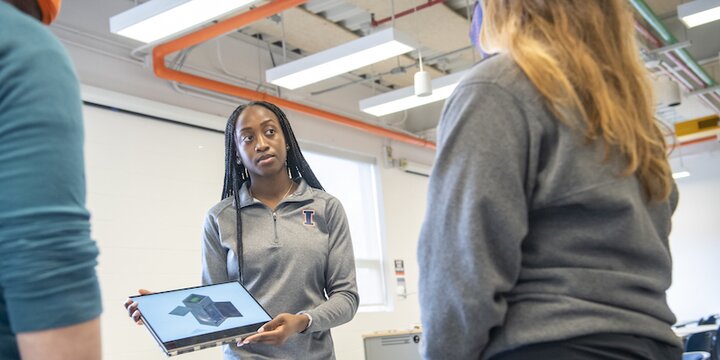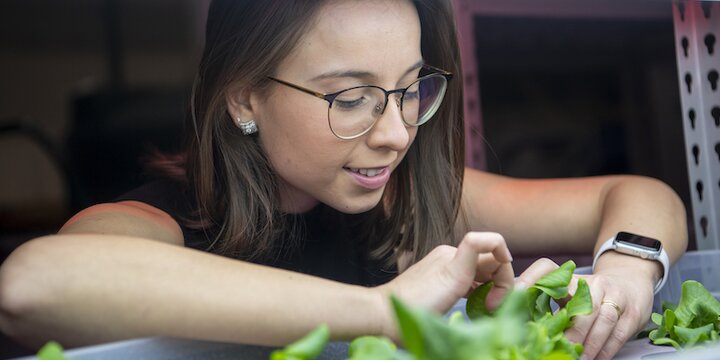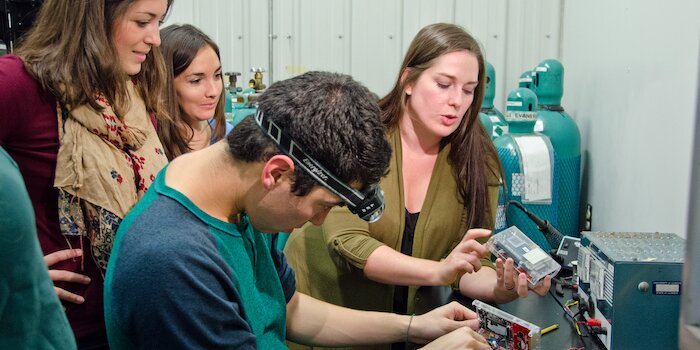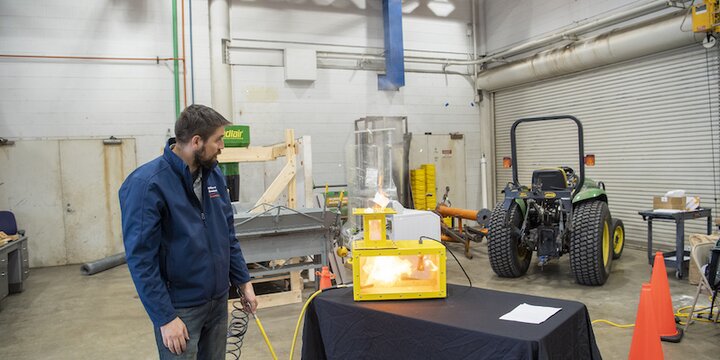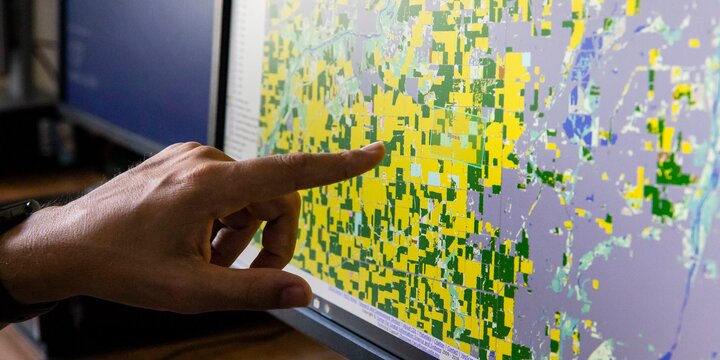Ranked #6 Nationwide
"...we provide students with the technical experience and problem-solving skills required to thrive in our fast-paced industry.”
-Ronaldo Maghirang, Deparment Head
If you are an effective communicator who wants to contribute to meaningful teaching, a graduate degree from ABE will enhance your professional development. We recognize that your contributions allow us to advance as world leaders and thrive collectively as peers. We place a high value on ethics and professionalism in our training.
Our department conducts research in all major areas of agricultural engineering and technical systems management, and our research projects are continually changing to meet new challenges and opportunities. Browse ourareas of studyto learn how you will join us as we feed and power the world.
For more information on graduate degree requirements, can also visit the University of Illinoisacademic catalog website.
Graduate Programs
- M.S. in Agricultural and Biological Engineering
- Ph.D. in Agricultural and Biological Engineering
- M.S. inEngineering Technology and Management for Agricultural Systems
- Professional Science Master's in Bioprocessing and Bioenergy
- Professional Science Master's in Engineering Technology and Management for Agricultural Systems
- Master of Engineering (M.Eng) in Digital Agriculture
Picking a Program
Here are some helpful hints on how to select a graduate program.
- If you know what your research interests are, you may want to speak with one of our faculty about their program or about researchers they would recommend.
- Another option if you know where your interests lie is to do an article search and then contact the authors of the articles which most appeal to you.
- Look at national rankings such as U.S. News & World Report to find out who has a good graduate program in ABE or in a different area of engineering. Technical systems management and related programs are not ranked, but the ranking of the associated ABE program is a good indicator of the quality of the ETMAS program.
- Attend the American Society of Agricultural and Biological Engineering Annual International Meeting and talk to people about their work and the programs at their institutions.
- Do undergraduate research to determine if you enjoy doing research.
- Visit the programs you are considering. While there, speak to some graduate students about their satisfaction with the program, their research, their advisor, and the institution.
- Ask about financing your education. Will you receive a stipend? Tuition waiver? Research funds?
Going to Professional School
Some of our students choose to pursue a professional degree upon graduation.The Career Centeris an excellent source of information about the skills and coursework important to the pursuit of professional degrees in law, health, or veterinary medicine upon graduation.
Student Testimonials
Jamison Watson (PhD ABE '21), Schmidt Science Fellow at MIT

"The Agricultural and Biological Engineering department at the University of Illinois allowed me to cater my graduate education to my ever-changing research interests. Through the ABE M.S. and Ph.D. program, I developed a holistic and comprehensive skill set that combined theory and practice while concurrently integrating my interest in foreign languages and area studies into the program. I appreciated the collaborative work environment that encouraged transdisciplinary learning and the supportive administration staff that would always lend a helping hand. Overall, the ABE graduate program provided me with an unprecedented level of scientific rigor, intellectual curiosity, and personal freedom, which was instrumental to finding a job upon graduation."
-Jamison Watson (PhD ABE '21)
Explore Our Graduate Programs
Areas of Study
Choose from the research areas below to be at the forefront of global innovation:
Agricultural Safety
Research involves model programs for collection of data related to farm injuries and illnesses, redesign of on-farm structures and management procedures to reduce risk of airborne contaminants to worker injuries, development of sensors on off-road vehicles for human detection and safety, utilization of behavioral psychology models in the prediction and analysis of agricultural safety behaviors and providing assistance to farmers with physical disabilities. Research is being conducted to develop a human presence detection system as part of intelligent safety protection systems for off-road equipment.
Bioenvironmental Engineering
Research involves environmental control for biological systems, indoor air quality, control of airborne contaminant emissions, environmental protection, animal response to environment, light frame structural design, and energy from biomass. A few specific projects include improving agricultural ventilation performance, reducing dust and odor emissions from livestock facilities, measuring airborne particulate distribution, providing good environments for laboratory animals, and converting swine manure into oil.
Food and Bioprocess Engineering
Research involves bioprocess modifications to develop new food coproducts with high nutritive or pharmaceutical value, to reduce food processing plant waste streams, and to evaluate improved starch characteristics of milled grains. State-of-the-art separation technologies, such as microfiltration, are being applied to conventional corn processes to give better products while gaining improved process efficiencies.
Grain Quality and Properties
Research involves developing improved corn wet and dry milling processes, dry-grind ethanol processes which remove the germ first (Quick Germ), determination of starch viscosity with rapid visco analyzer (RVA), drying effects on quality of grains, detection of extractable starch using near-infrared spectroscopy, measurement of fermentable starch, distiller’s dried grains (DDGS), and fatty acids, amino acids, and isoflavones in soybeans using FT-NIR and other physiochemical quality tests for grains and oilseeds.
Off-Road Equipment Engineering
Research involves advanced technology development for off-road vehicles, modeling of in-field crop handling systems, and evaluation of biofuels for diesel-powered vehicles.
Precision Agriculture
Research involves development of sensors, information mapping systems and control systems for more precise management of in-field crop planting and chemical application. Remote sensing is a major feature with the recording and processing of data from satellites, planes and ground-based vehicles leading to both map-based and real-time control of crop planting and chemical application.
Soil and Water Resources Engineering
Research involves the management of our soil and water resources, which includes watershed hydrology, subsurface drainage, runoff, and stormwater management.
Engineering Technology and Management for Agricultural Systems
Combining knowledge of science, systems management, and applications engineering, the ETMAS program provides excellent preparation for careers in the production, processing, and manufacturing of food, fiber, feed, fuel and construction management. Students focus on the application of engineering principles, the study of technology used in agriculture, and the integration of business concepts in the food and agricultural industries. ETMAS also has aProfessional Science Master'soption.
Water Quality
Research involves the processes related to water contaminant transport, effects of those contaminants on water use, processes causing contamination and the correction and avoidance of contamination of water. Contaminants of interest include sediment, nutrients, pathogens, and chemicals.
Energy and Sustainability Engineering (EaSE)
The Energy and Sustainability Engineering Certificate will allow you to do energy-related research conducted across the Urbana-Champaign campus. This certificate is available to those enrolled in a departmental master’s or Ph.D. program at Illinois.
Computational Science and Engineering (CSE) Concentration
As a graduate student in ABE, you have the option to participate in theComputational Science and Engineering (CSE) concentration. The CSE concentration is designed to provide graduate students at both the Masters and Ph.D. levels with a solid base in problem-solving using computation as a major tool for modeling complicated problems in science and engineering.
